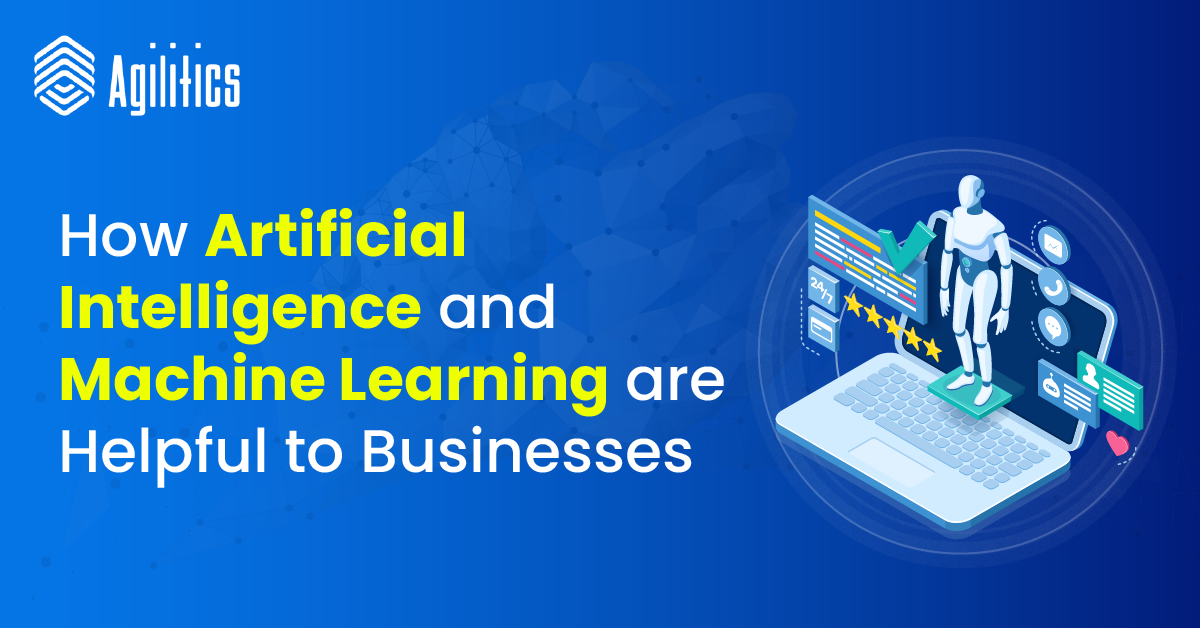Artificial intelligence’s relevance and applications in business are on the minds of today’s top companies. Artificial Intelligence in Business aids both large and small firms grow, ensuring better decision-making and revolutionizing management.
What is the importance of Artificial Intelligence in Business?
Artificial intelligence refers to a computer’s capacity to execute jobs usually performed by humans. For instance, the ability to make judgments, communicate with users, etc. To put it another way, AI is the process of teaching robots to think and act like humans (or even better). In most circumstances, AI does not replace people. Instead, it improves human skills and changes how we operate. Artificial intelligence is implemented via artificial intelligence software technologies. Artificial intelligence, or AI, is the ability for machines to learn and make their own decisions. These systems have in common: they access large datasets to learn how to mimic human behavior and carry out tasks efficiently. Artificial intelligence can be achieved by combining ML and NLP (Natural Language Processing), statistical analysis and algorithmic execution leading to algorithms capable of uniquely identifying a task and accomplishing it. Many modern applications such as Siri, Google Now, Cortana and others are based on AI. In the corporate world, AI offers several advantages and uses. It supports customer service, assures cybersecurity, conducts data analysis, aids in customer care, lowers energy costs, forecasts sales, and assists organizations in becoming more customer-centric, among other things. Artificial intelligence is commonly employed in product recommendation systems. These systems use advanced data analysis techniques to recommend items or information to consumers. If you purchase online, you’ll notice a lot of product recommendations in a day. A product suggestion, whether on an eCommerce website, in adverts, or emails, seeks to simplify purchasing choices by assisting customers in finding items that fit their needs. Many factors, such as a customer’s purchasing history or the behaviour of comparable users, might influence the recommendation. The Amazon recommendation system is the most well-known example. Amazon recommends many goods from the categories you’ve been exploring. The idea is to present you with things you are likely to click on and purchase. Amazon has built an AI-powered recommendation engine into practically every aspect of the shopping experience. Big data analytics and data-driven decision-making are essential to Amazon. A chatbot is a piece of software that simulates human communication (or a chat) with people via websites, mobile applications, and phones, among other platforms. It’s a digital assistant with artificial intelligence (AI) that communicates with humans. People nowadays want quick, convenient, and customized customer service at all times and in all places. It’s something that chatbots can help with. It’s a new marketing channel that allows companies and users to have an authentic personal experience. Chatbots are revolutionizing the worlds of business and marketing. They’re one of the most promising developments in user interface and customer experience. A chatbot is a computer program that simulates human conversation by using rules. These rules form the bot’s behavior or intelligence and are structured as if they were applied to an artificial neural network. Many users don’t even realize they’re talking to a bot, with some estimates suggesting that nearly 50% of companies using customer service chatbots. National Geographic Chatbot, SnapTravel, Wall Street Journal Chatbot, Whole Foods’ Facebook Messenger Bot, BabyCentre UK Bot, Hotel Marriot’s ChatBotler, Cheap flights Chat, and many others are among the most well-known chatbots. The purpose of these virtual assistants is to help customers reduce the time it takes to complete routine tasks such as checking on flight statuses, finding prices for grocery items, booking travel reservations and searching news articles. Such bots benefit cost-cutting and efficiency; therefore, unsurprisingly, many people expect them to become increasingly common in the future. Every second, an incalculable number of people search the internet for products and services. You must also put your company in front of them. How? With the help of effective content marketing! Material marketing is a marketing strategy that uses quality content to attract, engage, and delight consumers. Blogs, social media postings, podcasts, films, infographics, whitepapers, case studies, eBooks, how-to guides, webinars, and email marketing are all examples of content marketing. Artificial Intelligence’s involvement in content marketing is rapidly expanding. Artificial intelligence analyzes your existing data and devices the most effective content marketing tactics. If the study reveals that one material is more popular than another, for example, you may choose the best option for you. AI can assist you in determining what to write about, which keywords to use, how frequently to post, and so on. To put it another way, AI can assist you in producing high-quality, high-ranking content. There’s a lot AI can do for your business and marketing, from finding keywords to planning and generating unique content, distributing and optimizing blog pieces, and scheduling social sharing. Many companies take their marketing strategies to the next level by publishing high-quality blog entries, active social media messaging, engaging videos, and intriguing webinars, among other things. The technique of predicting and projecting future sales is known as sales forecasting. It’s a critical aspect in determining long-term business success. Sales predictions assist you to spot possible issues while they are still manageable. For example, if you see your team is falling 28 per cent short of the quota, you can figure out why. Perhaps a highly tempting discounting campaign is being launched by a rival. Businesses may use accurate sales predictions to determine the likelihood of consumer purchase, anticipate short- and long-term performance, and allocate resources accordingly. The AI-based programme analyzed CRM data, purchase history, and data from previous purchases. It examines data pieces, including emails, meetings, and phone conversations, then uses text mining to determine how they connect to sales results. The AI programme determines the next step of a particular consumer after analyzing how each data factor relates to sales success. JusCollege was able to handle the massive number of contacts streaming through their sales pipeline thanks to sophisticated sales forecast software. Revenues have climbed from $1 million to $20 million in only two years. Many credit card firms rely on artificial intelligence to assist financial institutions in preventing billions of dollars in fraud each year. Many industries, including retail, consumer products, automobiles, utilities, and telecommunications, rely on it. However, financial institutions are not the only ones that need to be concerned about cybersecurity. The danger of cyberattacks proliferates as digital organizations develop. Identity theft, account takeovers, vengeful ransomware outbreaks, and other threats may affect a company. Vulnerability management, phishing detection, Network Security, behavioral analytics, and preventative control are just some of the ways AI software may help with cybersecurity. Google is one of the most well-known instances. Google has always had and continues to have a strong cybersecurity culture. Google Gmail has employed AI and machine learning to filter and protect emails for years. Gmail is used by millions of individuals every day. Throughout a user’s session, AI detects fraudulent logins and monitors numerous elements of their behavior. Pricing influences customers while purchasing from businesses, particularly retailers. According to Deloitte research, pricing is crucial. We may live in the age of value, but price still reigns supreme. Pricing history, brand reputation, competition, quality, season, operational expenses, demand, and so on all have an impact on your price. Artificial Intelligence software can successfully take all of these considerations into account when selecting appropriate pricing. Let’s start by determining the best costs. These are the pricing that will entice your consumers while also allowing you to make the maximum money. AI software can sift through a large quantity of data, go through various pricing situations, and recommend the most appropriate price. It can assist you in determining the lowest price for any goods, at any time of year, and through any channel. Take, for instance, Lyft and Uber. Artificial Intelligence is mainly responsible for the existence of the ride-sharing industry. AI determines the cost of the ticket and the route it will travel. Fashion brands such as Zara and Michael Kors don’t simply employ AI for pricing. They are reliant on it. For years, Amazon and Walmart have used cognitive price optimization tools, including AI. Artificial intelligence isn’t just for global IT behemoths and industry leaders. Every forward-thinking company that wants to expand and remain ahead of the competition needs AI. What you’ll do using AI will be determined by the goals you’re seeking to attain. Artificial intelligence can transform how you manage your business by helping you make more intelligent choices faster. The AI landscape will change the parameters on which companies compete. It will be a massive opportunity for forward-thinking firms. We strive to provide business professionals with the skills and knowledge necessary to increase work performance and drive greater return on investment for the global customers we support. Agilitics delivers customized technology and management training solutions to large corporations and government agencies around the world.
How dose the Artificial Intelligence work? 7 ways Artificial Intelligence can help your Enterprise.
1. Product Recommendations Can Help You Make More Revenue
2. Enhancing Customer Service with Chatbots
3. Pop Geo
4. Develop the most effective content marketing strategy possible
5. Sales forecasting to expand your business
6. Intelligent cybersecurity
7. Make Your Price More Optimized


